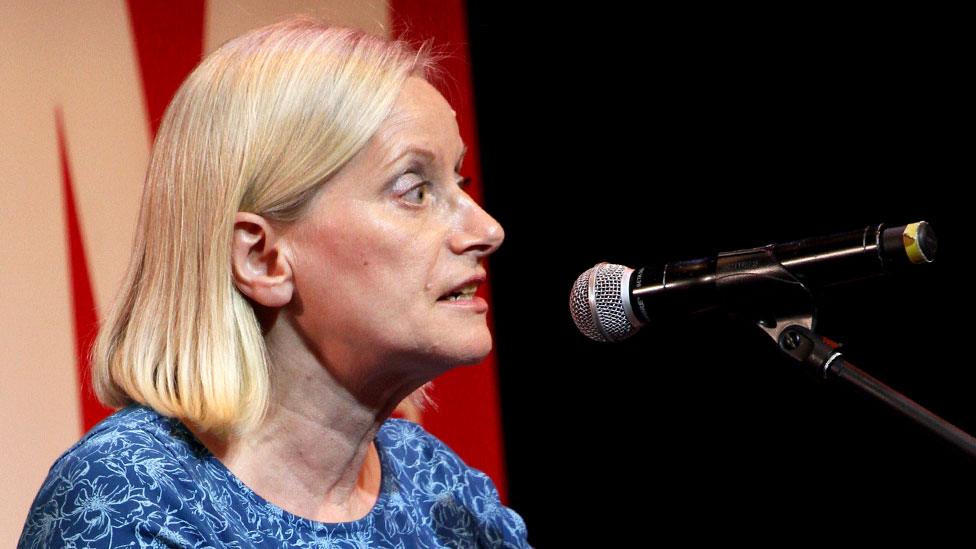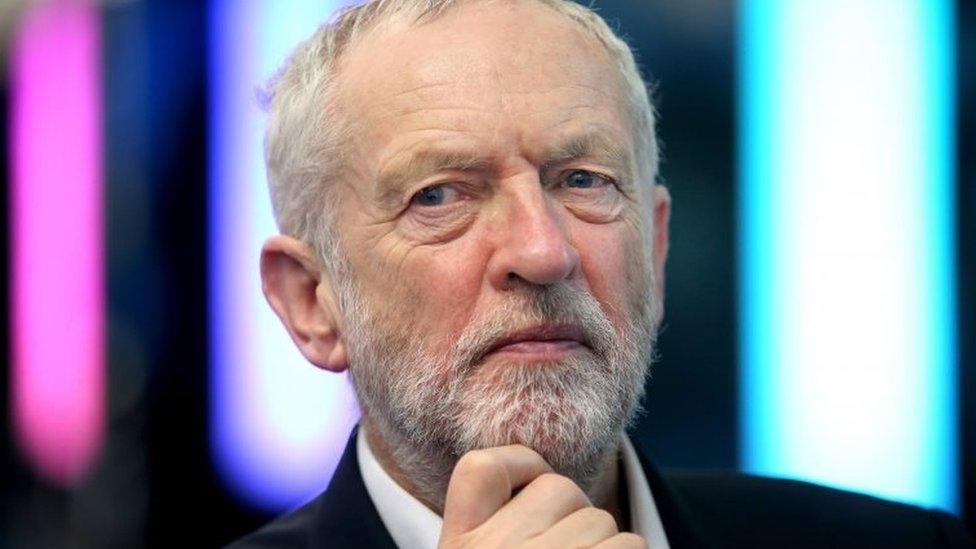The dispute over how Labour's disputes are handled
- Published

Christine Shawcroft has resigned as head of the disputes committee, after three months
Labour's disputes panel is appropriately named.
It consists of - in effect - the whole of Labour's ruling National Executive Committee (NEC) and the balance of power changed last autumn when its membership expanded, and three new representatives - all from the leftwing grassroots group Momentum - were elected.
Out went not the right-wing but left-wing incumbent, Ann Black - seen by some others on the Left as too much of a stickler for the rules, too close to party officials. And crucially, not trusted by the Labour leader's office.
In came Momentum supporter Christine Shawcroft who had questioned the very existence of the internal team - the compliance unit - that investigates breaches of the rules.
Jeremy Corbyn's critics say his judgment was awry in backing her. And she has now resigned from that post.
Ms Shawcroft won't be standing for re-election to the party's ruling body but there have been calls privately from NEC members - and publicly from former members and some current MPs - for her to be removed straight away.
Sources close to Mr Corbyn say the leader has no power to get rid of an elected member of the NEC, and there does not seem to be much inclination to apply pressure - beyond having urged her to stop chairing the disputes panel.
Replacement candidates
So the next dispute is over who replaces her in that role.
Staff in the leader's office have floated the name of Claudia Webbe, but this is being resisted by some members of the NEC.
They say she shares the same world view as Ms Shawcroft and has been too reluctant to take disciplinary action against members.
And she is an Islington councillor. Not a bar to office, but they fear it's shorthand for appearing too close to the leader's office.

Sources close to Jeremy Corbyn say the leader has no power to get rid of an elected member of the NEC
I am told that the suggestion that the previous incumbent, Ms Black, be reinstated has been met with robust opposition from Mr Corbyn's inner circle.
Rhea Wolfson, a left-wing NEC member who intends to stand down later this year, has been floated as an interim chair. But some fellow NEC members have had reservations.
Former shadow minister Shabana Mahmood has been suggested - she has a legal background, which is thought could be useful in controversial cases, but I understand the Labour leader's office haven't been overly enthusiastic.
She was criticised by the Jewish Leadership Council four years ago for backing a boycott of goods from Israeli settlements.
Her supporters argue that she was legitimately criticising the actions of an Israeli government and not attacking the existence of the state, or advocating a wider boycott of Israeli goods.
So some on the NEC are arguing that the disputes panel post remain vacant until the next scheduled meeting on 3 July, with the panel itself choosing the new chair.
But that suggestion also hasn't been welcomed by the Labour leader's office as the chair of the disputes panel also sits as an NEC "officer" - a group of nine who can significant influence over, for example, the selection of by-election candidates.
The Chakrabarti report
So currently there is a dispute over how disputes are handled in future.
To try to get on the front foot, the new general secretary and Corbyn ally Jennie Formby will move quickly to implement fully the findings of the two-year-old Chakrabarti report on anti-Semitism when she starts work on Tuesday.
Party officials say most of this has already been carried out, but I am hearing the appointment of an in-house lawyer to look at disputes is going to be a priority.
And the disciplinary process will be speeded up - though some staff are scratching their heads at how this will be possible without the promise of more resources.
Meanwhile, those battling against cases of anti-Semitism in the party are predicting more revelations and are talking about taking legal action under the Equality Act against Labour members they regard as apologists for anti-Semitism.
Those close to the leadership know that the problem of anti-Semitic behaviour needs a robust response but also recognise - in parallel - that the issue is being used by internal and external opponents of Mr Corbyn to try to dent his authority.
The left-wing Campaign for Labour Party Democracy issued a statement calling on members "to unite in defence of Jeremy and the party, against the unjust attacks" while saying: "The party (should) deal with any allegations of anti-Semitism with the seriousness they deserve."
Mr Corbyn himself has written to MPs defending "legitimate" criticism of Israel while again committing himself to "zero tolerance of anti-Semitism".
Some MPs have not reacted positively, denouncing the missive as "patronising".
More widely, Mr Corbyn may well feel he is now beginning to detoxify a damaging issue - but it's necessarily at the opportunity cost of promoting potentially more positive policies at the start of the local election campaign.